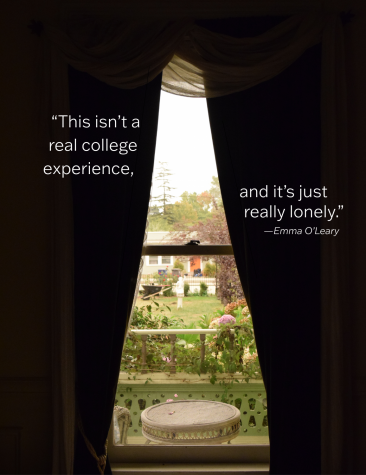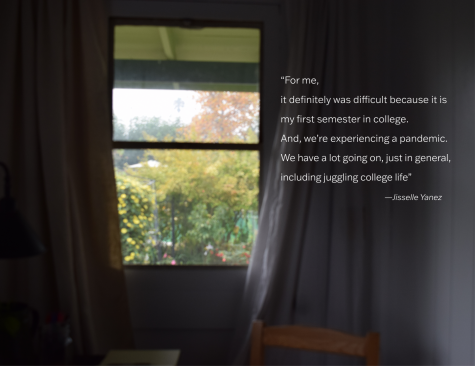What freshmen depression looks like during the pandemic
SF State freshman Emma O’Leary was devastated when she found out over the summer that all classes in the Fall 2020 semester were going to be online. She pictured her first year in college much differently than the reality she and many other freshmen are currently living in. She imagined moving out and meeting so many people, exploring San Francisco and living with new roommates. Instead, O’Leary started her freshman year in her childhood home and is taking her general education units virtually.
“Having to meet people online has been pretty difficult, and I’ve been feeling very alone. There have been a lot of days where I just cried and was really upset,” O’Leary said. “This isn’t a real college experience, and it’s just really lonely.”
Freshman year of college comes with sundry changes. First year students are prone to experience homesickness, heightened academic commands and a sense of more responsibility on their hands. Making new friends in a different environment can also be extremely challenging. All these factors contribute to depression and other mental health issues during students’ first year away at university.
 Despite online classes and limited on-campus housing options due to the pandemic, this notion of freshmen depression still exists, but for different reasons now. Various SF State first-year students transitioned from being high schoolers to college freshmen in the comfort of their own homes with their parents. Their university experience so far has been primarily virtual. Their expectations of college life is much different than the isolated reality of entering college during a global pandemic.
Despite online classes and limited on-campus housing options due to the pandemic, this notion of freshmen depression still exists, but for different reasons now. Various SF State first-year students transitioned from being high schoolers to college freshmen in the comfort of their own homes with their parents. Their university experience so far has been primarily virtual. Their expectations of college life is much different than the isolated reality of entering college during a global pandemic.
“It feels like we’re missing out on everything,” O’Leary said. “We’re not meeting people. We’re not having fun. We’re not exploring a new place, and we’re just sad at home.”
Jisselle Yanez, a first year student at SF State, explained how the downfall of her expectations affected her mental health during her first semester in college. She applied for housing in May, excited to start her college adventure, but a week later an announcement was released that all classes would be online and on campus housing would be restricted.
“Last year, if you would have asked me, ‘Where do you see yourself exactly a year from today?’ I would have told you I’d be on whatever college campus I chose, being socially active with everyone else, being involved in things, and having that face to face instruction,” Yanez said. “So I think [mental health struggle] definitely is a big part of it, just having to accept the fact that things changed.”
Because most classes at SF State are online, freshmen are spending more time indoors, which can have a negative impact on their mental health.
Yanez, who currently lives at home with her parents and her three younger siblings in Vacaville, California, reflected on her weekly schedule. She tends to stay indoors to work on her studies for a majority of the week.
“It’s definitely been challenging. I’m a pretty social person. Being stuck at home and doing the exact same thing everyday, the routine does get to me and it does affect me,” Yanez said. “I feel really unmotivated or I feel like I don’t have much energy to work on my school assignments or do what I need to get done. That has definitely been difficult.”
Yanez spoke about the class of 2024 and their transition to online learning during a time in the world where there is so much currently going on.
“For me, it definitely was difficult because it is my first semester in college. And, we’re experiencing a pandemic. We have a lot going on, just in general, including juggling college life” Yanez said. “All those things together create that sense of being depressed.”
Other SF State first year students reflected on their experience of transitioning into online college while quarantining with family members at risk of the virus. Patricia Duffey, a freshman studying theatre at SF State, spoke about feeling distressed throughout the pandemic for her parents health due to their underlying illnesses.

“It’s very worrisome. I know a lot of people are wary about getting other people sick, but it’s just very different when you’re not just worrying about the people you see at the grocery store,” Duffey said. “It’s a lot more worrisome knowing that your parents can be
directly affected by it.”
Duffey also reflected on how the disappointment of missing out on a normal college experience and having to take lock-down measures seriously for her parents’ well being affected her diagnosed anxiety. She added that through therapy, she has been able to cope with her stresses brought on by the pandemic.
Sf State psychology professors Melissa Hagan and Sarah Holley weighed in on the impact of mental health in first year students during the pandemic. They explained that freshmen may be feeling grief over the loss of possibilities.
“Students have to face not meeting new people as easily in classes since all classes have moved online and there isn’t much opportunity to just sit and chat before and after class,” Hagan said. “Again there may be feelings of loss and frustration that the college experience they had expected looks completely different and not in a good way.”
Holley talked about how freshmen may be more vulnerable to depression during this time. Holley explained that freshmen year comes with many changes. Although first year students during the fall of 2020 aren’t experiencing typical college transitions, changes caused by COVID-19 can spark depression in students, especially in those who were looking forward to moving out and making new friends in a big city.
“This year changes are occurring in the context of a major transition for the whole world as they grapple with the stress and challenges of life during COVID-19,” Holley said. “As a result, freshmen this year may be at increased risk for depression as they must simultaneously confront these different sets of stressors.”
Holley also explained how freshmen students can cope with the disappointment of not experiencing a typical first year of college and the struggles of staying indoors for long periods of time.
“Find safe opportunities to get outside when you can,” Holley said. “Even a 20 minute walk per day can be helpful for health and mental health.”

